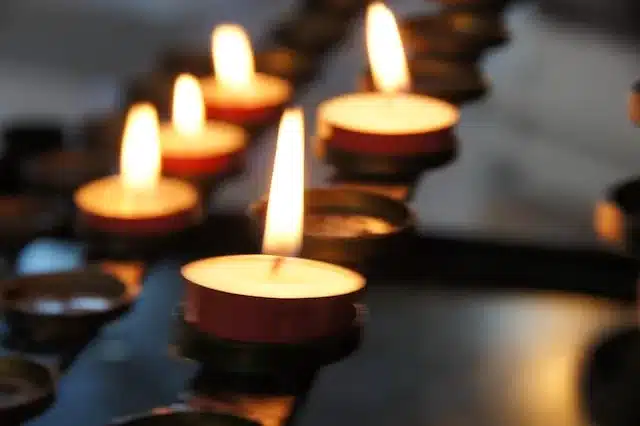Support with end of life, funerals and bereavement
We are here to support you with at every moment of your life. This page explores some of the ways in which we can support you at the end of life, with funerals and bereavement support.
End of life
The Church is very much present for people who are nearing the end of their life. For anyone who is seriously ill, please do let us know and we will visit and provide whatever support they would like. For many this will involve receiving the sacraments: confession, holy communion and the anointing of the sick. For those who are not well enough to receive all three, we will offer the anointing of the sick to those who would like it. This is a really powerful sacrament, open to anyone who is suffering from a serious illness or is simply very elderly. It is a practice that we find in the Letter of St James in the Bible, where we are told that if anyone is sick they should send for the priests of the Church and the priests will pray over them, anointing them with oil in the name of the Lord.
Funerals
We celebrate funerals for those who have died and provide help, support and guidance to families who are preparing for a funeral. Please do get in touch for any information or advice.
For those wanting to plan their funeral or give their wishes for this, we have produced a booklet to help you make these decisions. We also have a booklet showing the choice of suggested readings for funerals.
There are now three options in the UK for funerals: burial, cremation and resomation (also known as alkaline hydrolysis or water cremation).
As resomation is a new option in the UK, we are providing some information on the ethical questions concerning it.
Resomation
Resomation is a relatively new process in which the natural decomposition of the body is accelerated using a heated alkali and water solution. After about three or four hours this leaves the bones and a residual fluid. The bones are then crushed in the same way as with cremation to produce the ‘ashes’ that are returned to the family.
Resomation is often presented as a more environmentally friendly choice than traditional burial or cremation. Robinson has written an interesting paper on the environmental impact of different types of funeral.
As resomation is still relatively new, the Church hasn’t made any official pronouncements on the ethical implications of it. The bioethicist Sr Renée Mirkes has written the most detailed evaluation in which she concludes that resomation in and of itself is a morally neutral action, but that bishops might take a prudential view not to allow it in their diocese if it led to a coarsening of respect for the human person. A number of Bishops have done so. The Archdiocese of St Louis, for example, has issued a recommendation that Catholics avoid this process until a more respectful means of disposing of the liquid remnant of the process is available (at present it is generally treated and reintroduced to the sewage system, although in some places it is used as fertiliser).

